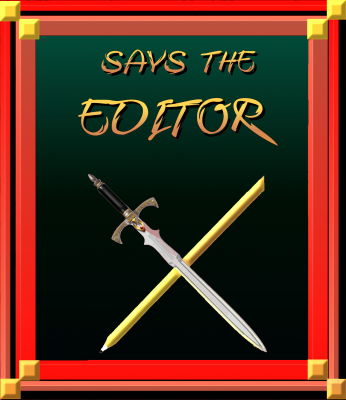October 18, 2017

It’s finally happened. And so, it’s time to change the mindset of many many authors, readers, and publishing professionals.
For years and years — and remember, I put the first Demo Tapes anthology for sale in 2008, and this attitude pre-dates even that — the general wisdom was simple: self-published books didn’t have nearly the quality of books from the major publishers. Now, some of that referred directly to production quality, and that’s been fixed many years on now.
What’s lingered has been the stigma about the writing and editing.
No more, I say.
I’ve ranted here before about finding significant numbers of typos in books published by the big houses. I’ve ranted about bad writing.
It’s not only in self-published books anymore, boys and girls.
So no more. No more putting down the indie writers as a whole. A number of them won’t stand for excessive typos and lazy writing any more than you or I would. Many of them are my clients, but even more aren’t (simply because I can’t work for everyone. I’m only one person, after all!).
And a very very large number of them would be mortified if I nodded my head in agreement showed up in a book with their name on the cover.
That’s because I have yet to find another body part that you nod. Oh, a body can nod off to sleep, but that’s entirely different. And a character or a person can certainly nod to show they are paying attention, or nod to show interest, but it’s pretty widely assumed that a nod means assent of some sort — even assent that attention is being paid or that the subject at hand remains interesting. So there’s no need for that in agreement phrase that’s thrown in. The reader will assume it’s there unless they are specifically told why the nod isn’t one of agreement.
This falls into the “Shit!” he swore school of bad writing.
Come to think of it, I found that in a book from one of the big publishing houses, too. Recently.
So. Enough. Enough denigrating an entire publishing model — one that works for a number of authors and readers — based on a lack of polish that the other, more highly regarded (although more and more, I do not know why this is so) model increasingly unleashes on the public.
Stick to the books that are well written and well edited. Period. It no longer matters which publishing model you follow or who published the book in your hands.
A lot are good. A lot are bad.
Publisher simply doesn’t matter anymore.
April 14, 2017
Well, not ALL about language, or we’d be here through the next couple of A to Z Challenges, and this puppy only happens once a year.
Today, we’re going to focus on lazy language. On what happens when you slap words on a page and don’t think much of it.
Honestly? Not much. I’m one of the few who will call a person out for using lazy language, and certainly, my clients come to me for a line or content edit hoping I’ll do exactly that. So, you know, since you’re paying me, I’m more than glad to…
Seriously. This is actually one of my newest and biggest pet peeves. It’s a certain construction: to where, from where — it makes me scream.
It’s lazy.
Pure and simple. It’s lazy.
And you, as an author, can do so much better.
Like this: She walked to where he waited near the water fountain.
Seriously. I see this stuff all the time, not only from my clients (who often wind up having it challenged out of them) but from books I read for pleasure. Not a lot of pleasure when it’s the same as dragging fingernails down a chalkboard.
Try this instead: He was waiting near the water fountain. She joined him.
Or even: She joined him at the water fountain.
(Whoa! I got rid of another poor language choice: she walked— that’s one that you can usually let your reader infer for themselves. Believe it or not, they will.)
He looked near where the sailboats sat. Beside them was where the mugging had taken place.
How about: He gazed across the marina. Right there. Beside the sailboats. The mugging had taken place right there.
And look at that: snappier language. Better cadence. You know that spot’s important, and that those pesky sailboats were somehow important and we’ll be hearing from them again. Do you get all that from the first example?
That’s why I call this lazy. Sure, we talk that way. Even I do, and I have no issues admitting it.
But speech and writing are different creatures, and it’s worth going that extra mile to get rid of the lazy stuff and replace it with something smarter, more precise, snappier. Not to say that it always has to be snappier, but it should always be more precise. After all, you only have so many words to work with, even when you’re going to self-publish and that means the word count is 100% up to you.
It’s a question of bloat. Of making your language work for you, not against you (which bloated language does).
So before you send me your manuscript, take a few minutes. Do a search for to where, near where, from where. See if you can change them.*
If not, be prepared for an awful lot of comments.
.
.
.
*Sometimes, you need the to where, near where, from where construction. SOMEtimes. Not all the time. Not on every page (Best-selling romance author, I’m looking at you). SOME is fine. Usually.